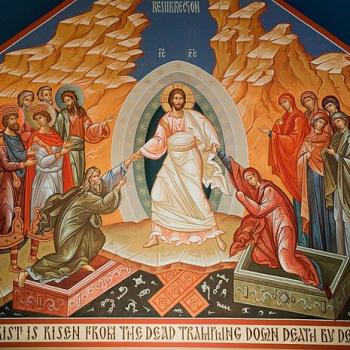This is the third post on a series exploring the sacrament of chrismation. Click here for Part One
and here for Part Two.
![Book of Job in Illuminated Manuscripts.List of Byzantine Manuscripts with Cyclic Illustration.Mount Athos.Megisti Lavra Monastery. [Public domain], via Wikimedia Commons](https://wp-media.patheos.com/blogs/sites/637/2017/06/LB100fol165-300x297.jpg)
There is neither separation nor opposition here: the reality of life in Christ is the body of Christ, animated by the Holy Spirit dwelling in it. This makes understandable the convergence, approaching identification, of the life in Christ and the life in the Holy Spirit, as can be seen in the following comparisons from the apostolic epistles: We are “justified in Christ” (Gal. 2:17) and “by the Spirit of our God” (1 Cor. 6:11); we are “sealed” (Eph. 1:13; 4:30) and “circumcised” (Col. 2:11) in both; we have joy (Phil. 3:1; cf. Rom 14:17), faith (Gal. 3:26; 1 Cor. 1:9), love (Rom. 8:39; Col. 1:8), and fellowship (1. Cor 1:9; 2 Cor. 13:14) in both. [1]
We are called to be the continuation of Christ’s presence in the world; as we are incorporated into Christ, we are then to be open to and welcome the Holy Spirit, to truly become christs in Christ. We are to be God’s anointed on earth, not just for our own sanctification, but also for the sake of the world. As God the Word entered the world to show forth his love and save it, so we should continue with what God the Word has done, go forth in the world, and through the Spirit in us seek to sanctify it and make it holy. Just as we can turn our backs on Christ even after baptism, so we can close ourselves off from the Spirit after being anointed in its graces. Paul clearly warned us not to do so:“And do not grieve the Holy Spirit of God, in whom you were sealed for the day of redemption” (Eph. 4:30 RSV). Paul wrote these words for a body of believers who had been baptized and sealed with the confirmation of the Holy Spirit at their baptism. His words indicate that even though Christians have been strengthened by the Holy Spirit, they can still fight against its work in their lives, and hinder their spiritual life and indeed, find themselves among the lost if they strangle the Spirit of Life in themselves.[2] On the other hand, if they completely empty themselves of all barriers between themselves and the Spirit, if they welcome the grace and let it transform them, not only will the Spirit give them spiritual gifts, but the Spirit will give them a sense of spiritual safety. The Apocalypse indicates that the seal of the Spirit is able to serve as protection against God’s wrath:
After this I saw four angels standing at the four corners of the earth, holding back the four winds of the earth, that no wind might blow on earth or sea or against any tree. Then I saw another angel ascend from the rising of the sun, with the seal of the living God, and he called with a loud voice to the four angels who had been given power to harm earth and sea, saying, “Do not harm the earth or the sea or the trees, till we have sealed the servants of our God upon their foreheads.” And I heard the number of the sealed, a hundred and forty-four thousand sealed, out of every tribe of the sons of Israel… (Rev. 7:1-4 RSV).[3]
Obviously, insofar as we continue to sin, we grieve the spirit, and strangle the work of the Spirit in our lives. For our sin, we will then have a lack of grace in us, a lack of perfection, a whole in our being, and God’s wrath will come to us in our imperfection as a fiery love, seeking to transform us into the persons God intends us to be. It is possible we will suffer for a time in that wrath, not out of mere punishment, not out of malice, but as the fruit of our actions are exposed. As long as we are open to the purifying work of the Spirit, God’s love will work in us and correct us and make us holy, though we will have to lose, as it were, all the reified habits of sin and the crust it has placed over our personage, and that extraction, done out of love, will often hurt. Just as medicine which is applied to a cut might make it sting, and this is indicative of its effectiveness, our spiritual healing often comes with a short sting of its own. And so even if we will not be harmed, this is not to say we will not face the fiery love of God and find it burns through us to the very core of our self, taking out all that remains of sin and the inclinations of sin in us, and receive in its place a cauterization which pains and heals us at the same time. We receive the Holy Spirit to strengthen us and to protect us from harm, but the Spirit is the Spirit of God: the Spirit looks at and examines all who come in contact with it, lifting them up if they are willing, healing them, giving them true freedom and power to act. Thus, in and through the sacrament of chrismation it can be said that, “The power of this sacrament is the giving of the Holy Spirit for strengthening, who in baptism was given for remission.” [4] It strengthens, yes, but we must be open and willing for its continued work in us, its continued strengthening of us, if we are to become Spirit-filled, walking completely in the Spirit without the weakness of sin.
This is not to say that those who are confirmed, and fall into sin, receive nothing from the Spirit. The Spirit is still with them, working in and through them, working to establish them once again on the proper path. If the sin is great, the Spirit wait for a change of heart, metanoia, and until then, it resides with the person but becomes as it were, inert:
Similarly, the Spirit of Christ is present with integral wholeness in all who are members of Christ, activating and generating life in all capable of participating in it; and in His compassion He still sustains even those who through some weakness do not actively participate in the life of the Spirit. In this way each of the faithful participates, by virtue of his faith, in adoption to sonship through the Spirit; but should he grow negligent and fail to sustain his faith he will become inert and benighted, deprived of Christ’s life and light. Such is the state of each of the faithful who, though a member of Christ and possessing the Spirit of Christ, fails to activate this Spirit within himself and so is stagnant, incapable of participating in the life of grace.[5]
The Spirit continues in those who receive the sacrament of chrismation similar to the way baptism is said to leave a definitive “mark” on the soul. The sacrament is to be received once, and those who receive it, will have the Spirit in and with them. If they grieve the Spirit, the Spirit will not interfere with them. The Spirit will remain, willing to once again energize the one who reopen themselves to it through repentance. Failure to live out one’s confirmation does not mean they entirely cut out the Spirit from their lives, rather, it is as though they compartmentalized the Spirit in a closed-off space in their being; hopefully, they will see what they have done, repent, and open themselves back to the Spirit so to have a proper spiritual life again.
[1] Sergius Bulgakov, The Comforter. Trans. Boris Jakim (Grand Rapids MI: William B Eerdmans Publishing Company, 2004), 298.
[2] One of the problems with Scripture is that anyone can pick it up, not understand the audience, and misapply a text believing it is about themselves. Those who do not have the sacrament of confirmation, those who do not have the authentic gift of the Spirit by the laying on of hands and use of holy chrism, often think of themselves as sealed by the Spirit because they read texts like this without understanding that Paul expected Christians would receive an actual anointing which seals them with the Spirit at their baptism. Paul was talking to those who literally were sealed by the Spirit through an actual ritual act, not just those who assume the Spirit guides them merely because they believe Jesus is Lord.
[3] Numbers used in the Apocalypse are symbolic in nature, and should not be taken literally.
[4] Peter Lombard, The Sentences. Book 4: On the Doctrine of the Signs. trans. Giulio Silano (Toronto: Pontifical Institute of Medieval Studies, 2010), 39 [VII-3].
[5] St. Gregory of Sinai, “On Commandments and Doctrines” in The Philokalia: The Complete Text. Volume Four. trans. and ed. G.E.H. Palmer, Philip Sherrard, Kallistos Ware et. al. (London:Faber and Faber, 1995), 248.
Stay in touch! Like A Little Bit of Nothing on Facebook:
A Little Bit of Nothing















